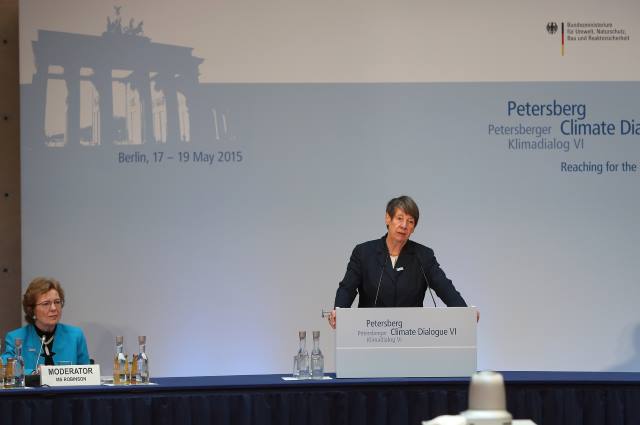Ministers from 35 countries convene in Berlin as the call for transformative leadership increases ahead of COP21 in Paris.
From 17-19 May 2015, German Federal Environment Minister Barbara Hendricks and French Foreign Minister Laurent Fabius co-chaired the 6th Petersberg Climate Dialogue in Berlin. Mary Robinson, UN Secretary General’s Special Envoy on Climate Change and President of the Mary Robinson Foundation – Climate Justice attended and moderated a session on Means of Implementation during the Dialogue which brought together ministers from 35 countries.
With COP 21 a little over 6 months away and a new climate agreement within reach, the spotlight is beginning to shine on world leaders and government ministers, those with the power to authorise the ambition necessary to set the world on a path to a stable climate and a safe future. In this regard, the 6th Petersberg Climate Dialogue was an important milestone on the road to Paris and all the more significant as the G7 Summit in June will also take place in Germany in a month’s time.
The Dialogue focused on mobilising the political will necessary to ensure that the COP in Paris realises its potential as a moment for transformation in the global effort to tackle climate change. The importance of the Dialogue was underscored by the presence of German Chancellor Angela Merkel and French President François Hollande.
A global transition on the scale required to avoid dangerous climate change demands transformative leadership from all countries. However the nature of this leadership differs between countries and depends on national contexts. In her keynote speech Chancellor Merkel said that industrialised nations have contributed the most to climate change and now they have an obligation to help those still developing, as a matter of fairness and responsibility.
Recent research by the Foundation, Zero Carbon Zero Poverty the Climate Justice Way, indicated that industrialised countries must take the lead in dramatically reducing their emissions – the world must reach zero carbon emissions by 2050 in order to maximize our chances of staying below 2 degrees of warming above pre-industrial levels. Yet the necessary leadership from developing countries poses a greater challenge as it requires them to chart new growth pathways that enable human and economic development without relying on fossil fuels. Such development has, to date, never been achieved.
In this transition to a zero carbon future, the realisation of climate justice requires that the right to development of all people is protected. As the world needs unprecedented leadership from developing countries in order to avoid dangerous climate change, the leaders of the industrialised countries must provide support to ensure that new development pathways are affordable and doable. This support – financial, technological and capacity building – is key to breaking the longstanding deadlock in climate negotiations, but time is running out. The leaders of the world’s major economies must demonstrate they are capable of brave ambition and global solidarity by committing to meaningful support for poorer countries.
In his address to the Dialogue, French President Hollande said that climate change not only posed a threat, but also an incredible opportunity to create new development models. However he added that in order to secure an agreement in Paris, developing countries need to know that the industrialised countries will stand by them.
The upcoming G7 Summit to be chaired by Germany in Schloss Elmau, Bavaria, provides a great opportunity to demonstrate genuine transformative leadership. As Chancellor Merkel said in her concluding speech in Berlin, industrialised countries must take the lead in climate action and the G7 can give an important signal in this regard. In the Petersberg Dialogue Call for Climate Action, a joint statement released by Chancellor Merkel and President Hollande at the conclusion of the two day event, the leaders said “our countries will continue to show leadership in this profound transformation of our economies and our societies towards full decarbonisation”.
Related Links:
Sixth Petersberg Climate Dialogue
Petersberg Climate Dialogue – Co-Chairs Conclusion (19 May 2015)
Our work on equity and climate justice


